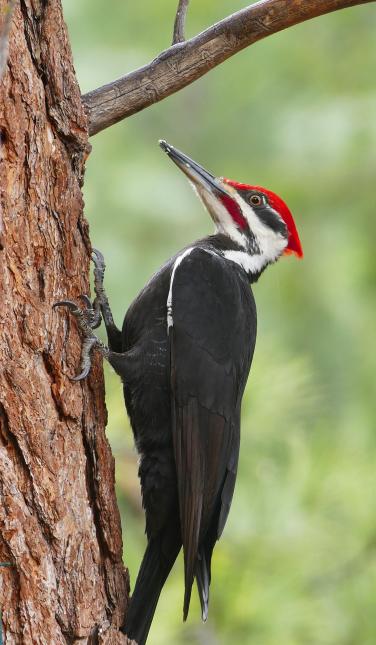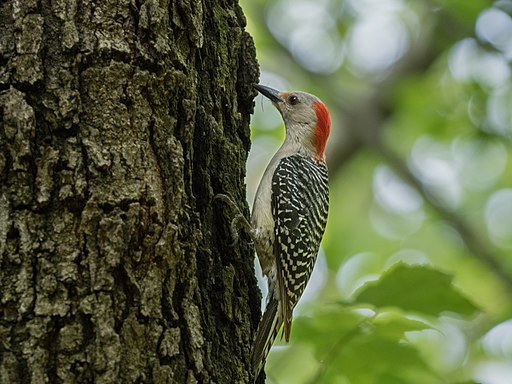Woodpeckers Unleashed: Exploring the Wonders of These Proficient Tree Climbers
Woodpeckers, with their distinctive markings and rhythmic drumming echoing with wooded areas, hold a distinct area in the avian globe - Woodpeckers in Florida. As we dive into the complex information of woodpeckers' nesting practices, feeding strategies, and the ongoing conservation efforts to shield these amazing birds, a deeper admiration for their place in nature unfolds.
Composition and Adaptations
When checking out the anatomy and adjustments of woodpeckers, one can observe amazing functions that make it possible for these birds to grow in their specialized ecological niche. Woodpeckers are furnished with a collection of one-of-a-kind physiological characteristics that aid them in their woodpecking habits. One of one of the most famous attributes is their solid, chisel-like beak, which is specialized for exploration right into timber to reveal insects or create nesting cavities. This beak is supported by strong neck muscles and a highly developed head framework that works as a shock absorber, permitting woodpeckers to repetitively eat trees without creating mind injury. In addition, woodpeckers have zygodactyl feet, with 2 toes dealing with ahead and two dealing with backward, offering a firm grasp on tree trunks while they look for food or drum for interaction.
In addition, woodpeckers have an unique tongue framework that is long, barbed, and sticky, allowing them to draw out insects from holes in wood. This specialized adjustment enables woodpeckers to exploit a food resource that is unattainable to numerous various other bird types. Overall, the makeup and adaptations of woodpeckers display the exceptional evolutionary remedies that have allowed these birds to prosper in their arboreal habitat.
Drumming Actions
Having discovered the composition and adjustments of woodpeckers, the focus currently moves to recognizing their drumming habits, a distinct element of their interaction and territorial screens. Drumming is a vital type of interaction among woodpeckers, offering multiple functions such as developing areas, bring in mates, and signaling alarm system. Each woodpecker species has a special drumming pattern that aids individuals acknowledge participants of their own types and distinguish them from competitors or killers.
Woodpeckers produce drumming audios by quickly pecking on powerful surfaces such as dead trees, utility poles, and even metal items, developing a collection of rhythmic beats. The intensity and rate of drumming can differ based on the function; for example, a quick drumming sequence may symbolize aggression towards trespassers, while a slower and softer drumming pattern can show courtship (Woodpeckers in Florida). Additionally, woodpeckers may change the regularity and period of their drumming to convey particular messages successfully
Nesting Behaviors
Exploring the additional resources nesting routines of woodpeckers discloses interesting understandings into their reproductive actions and environment choices. link Woodpeckers are recognized for their unique nesting preferences, commonly digging deep into cavities in trees to create sheltered spaces for increasing their young. These tooth cavities offer not just as a nesting website however likewise as a safe haven from killers and severe climate.
Woodpeckers show a high degree of fidelity to their nesting sites, often returning to the same location year after year. This behavior highlights the importance of ideal environment schedule for their reproductive success. The option of a nesting site is important for woodpeckers, with aspects such as tree types, height, and decay phase playing substantial functions in their decision-making process.
Interestingly, some woodpecker species are recognized to dig deep into several cavities within their territory, giving themselves with different nesting choices. This technique may work as a type of insurance coverage against possible dangers or disturbances to their primary nesting website.

Feeding Methods
One of the most unique feeding behaviors of woodpeckers is drumming, which involves quick pecking on trees to reveal pests underneath the bark. Woodpeckers are likewise known to excavate dental caries in trees to accessibility concealed insect larvae or sap. Some types, like the acorn woodpecker, store nuts in particularly developed holes called granaries.
Conservation Initiatives
Among the complex feeding techniques exhibited by woodpeckers, the conservation initiatives focused on protecting these fascinating birds play an essential duty in maintaining their habitats and populaces. Woodpeckers deal with various hazards to their survival, consisting of habitat loss as a result of logging, climate adjustment altering their ecological communities, and accidents with man-made frameworks such as buildings and lorries - Woodpeckers in Florida. Guardians are actively functioning to address these obstacles and guarantee the lasting wellness of woodpecker varieties

Education and public recognition campaigns are also vital parts of woodpecker conservation efforts. By elevating understanding about the importance of these birds in preserving healthy woodland environments, conservationists can amass support for environment conservation campaigns and promote liable land administration practices. With collaborative initiatives between scientists, policymakers, and local neighborhoods, we can collaborate to secure a future where woodpeckers prosper in their natural environments.
Conclusion
